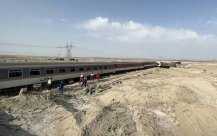(London / Istanbul Road Power Power Power) global food inflation is still high, and the impact of developing countries is particularly significant, which also exacerbates the risk of people's food and social turmoil.
For many developing countries, basic food has now become luxury goods.Gamagi, a citizen of Istanbul, Turkey, said that he could not afford fresh food, and the whole family could only eat noodles, wheat and vegetable beans."Everything becomes so expensive. We can't buy whatever we want to eat. We can only buy it. My children are malnourished."
In the past two years, under the influence of the crown disease and climate change, global food prices have risen.With the outbreak of the Russian and Ukraine War, the price of grain was further rising, and the Food Price Index of the Food and Agriculture Organization of the United Nations in February and March hit a new high.
In many developing countries, the proportion of food in inflation baskets is the largest. For example, in India and Pakistan, the proportion is about 50%, and about 40%in some low -income countries.
In order to ensure domestic supply, the country of grain production has begun to tighten food exports.India issued a wheat export ban last weekend; in order to inhibit domestic edible oil prices soaring, Indonesia has suspended the export of original palm oil and other palm oil products at the end of last month. Fortunately, the ban will be canceled today.
Cavaloli, director of the Global Market Research Department of the Bank of Paris, said that the Russian and Ukraine War not only interfere with food supply, but also affects the supply of fertilizers. As a result, food inflation will be more lasting.
Inflation has become a major heart in various countries. The annual inflation rates in Turkey and Argentina are approaching 70%and 60%, respectively. From Brazil to Hungary, other countries have also experienced double -digit inflation.
Bluebay Asset Management Company's emerging market debt department head of the debt department, Kurdiafko, said that there are three options for governments of various countries: 1. Provide more subsidies for consumers;For inflation and social turmoil;She said, in any case, "there is no easy solution."
The World Bank has lowered the economic growth forecast of emerging economies this year
Emerging economies must not only inhibit inflation, but also maintain fragile economic growth under the global interest rate.The World Bank has lowered the forecast of economic growth of emerging economies this year, from 6.3%previously estimated to 4.6%.
Economists are also worried that food prices will continue to rise, which may make emerging economies face a new wave of social turmoil.Avilzic, chief economist of European Revival Development Bank, said that the situation in North Africa is particularly severe."The Russian and Ukraine War is ironic that everyone expects Russia to have a crisis, but in fact, North Africa countries are still in an emergency because of high food prices."
The British Risk Consulting Company Verisk MapleCroft released a prediction last week. By the fourth quarter of this year, three -quarters of countries with high risk of social turmoil are expected to be in the country with high risk of turmoil.




